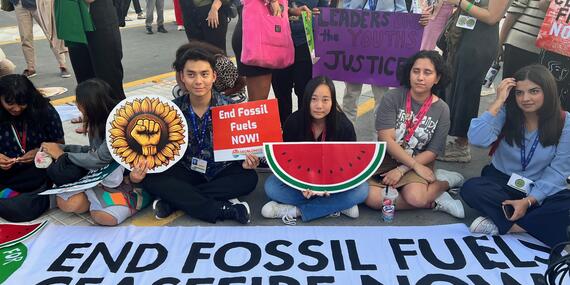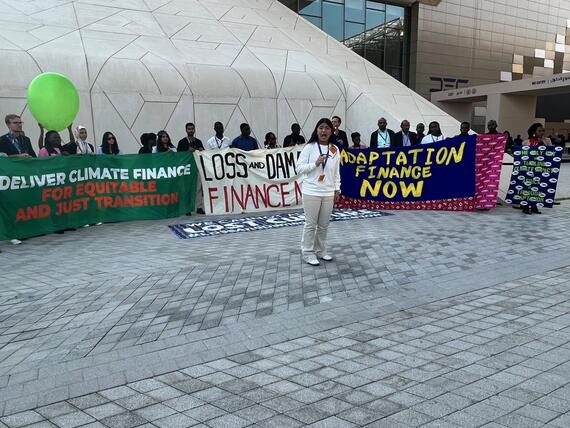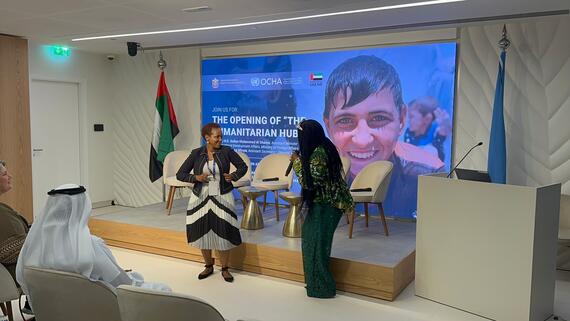COP28: Four outcomes that matter to the aid community

It’s a wrap for the 28th UN Climate Change Conference (COP28), held in Dubai.
The conclusions drawn at the end of the two-week event are proof that the humanitarian community must work even harder to help people most vulnerable to the climate crisis.
Here are the four key outcomes that matter for the aid community:
1.We will likely overshoot the 1.5°C warming threshold
COP28 closed with an agreement signalling the beginning of the end of the fossil fuel era, but it stopped short of setting actual targets to phase out non-renewables. The global stocktake acknowledges the science that calls for global greenhouse gas emissions to be slashed by 43 per cent by 2030, compared to the 2019 levels, to limit global warming to 1.5°C – but it notes that countries are off track to meet that target.
"We have reached a critical juncture where phasing out fossil fuels is imperative to avoid surpassing the 1.5°C warming threshold,” said Harjeet Singh, Head of Global Political Strategy at Climate Action Network International (CAN-I), which includes more than 1,900 civil-society organizations in more than 130 countries.
But as the world is off track from this emissions target, it is increasingly likely that we will overshoot the 1.5°C warming threshold set by the Paris Agreement.
Zinta Zommers, OCHA’s scientific lead on climate, explains why that is important: “Current levels of emissions reductions mean that we will be dealing with even more unpredictable weather, extreme heat and rising sea levels that threaten the existence of island countries. Not only will the aid community have to deal with increasing needs, but climate change will also impact the way we deliver services and assistance to the most vulnerable.”
This is why Toeolesulusulu Cedric Pose Salesa Schuster, Samoa’s Minister of Natural Resources and Environment, told OCHA before the final COP28 consensus: “We don’t want to be signing our death certificate.”
Climate scientist Joyce Kimutai and the International Organization for Migration’s Manuel Marques Pereira explain what missing the 1.5°C ceiling will mean for both vulnerable people and for humanitarians.
2. We need to advocate for the Loss and Damage Fund
One of the more positive developments at COP28 was the decision to inject money into the Loss and Damage Fund to make it functional.
"Although COP28 marked a significant milestone by operationalizing the Loss and Damage Fund, its initial contributions of over US$700 million are drastically insufficient for current needs,” pointed out CAN-I’s. Singh.
He added that in the coming year, wealthier nations need to make substantial contributions to enable “immediate assistance to affected communities,” and that this money should “originate from national budgets, and we must reach a consensus on taxing both the fossil fuel industry and other polluting sectors, aiming to generate billions of dollars.”
OCHA’s Zommers said the humanitarian community will have to advocate more than ever for substantial funding to reach the most vulnerable communities, but it will also have to reflect on how best to coordinate with this new Fund to ensure maximum impact.
The decision by the United Nations Framework Convention on Climate Change (UNFCCC) called for the UN Secretary-General to bring the climate, humanitarian and development communities together each year to discuss how to address losses and damages.
Singh also noted: “The decision to host this fund under the World Bank has raised significant concerns, primarily due to the Bank's loan-based model and its tendency to serve the interests of rich countries, which are its major shareholders.”
Local organizations on the ground told OCHA they would like to see the loss and damage money flow directly to communities affected by climate change.
3. We need to invest more in adaptation and anticipatory action
The Adaptation Fund set up under the UNFCCC to raise money for vulnerable countries to cope with the climate crisis mobilized nearly $188 million in new pledges at COP28. But this falls short of the Fund’s resource mobilization goal of $300 million for 2023 for its growing pipeline of projects not yet funded, which has reached $425 million.
The needs are substantially higher, Singh said. “As underscored by a recent UN climate report, we must substantially increase adaptation finance to 10 to 18 times its current level. At the same time, it is crucial to support communities already impacted by climate crises, who are losing homes, farms and livelihoods, with costs now exceeding hundreds of billions of dollars annually.”

Zommers stressed that “This means a heavier burden and responsibilities on the shoulders of the humanitarian aid community, who are on the front lines of the climate crisis.”
Another important outcome of COP28 was the Charter to Get Ahead of Disasters, endorsed by more than 40 countries and organizations. “We will need to invest more in anticipatory action and in advocating for adaptation to take place in fragile contexts,” said Zommers.
Since 2006, the OCHA-managed Central Emergency Response Fund (CERF) has allocated an average of 27 per cent of its funding to extreme weather-related crises each year. At COP28, OCHA launched CERF’s Climate Action Account, which will boost the ability to anticipate and respond to the impacts of climate change. It also enables CERF to channel climate-related and other financing to the most vulnerable people.

4. The Humanitarian Hub amplified aid organizations at COP28
OCHA and the Inter-Agency Standing Committee established the first-ever Humanitarian Hub at a COP event. The Hub hosted more than 40 events organized with the support of dozens of entities, including local and international humanitarian partners, academics, the private sector and Governments.
The Hub aimed to showcase how climate-related disasters affect people in crisis situations and spotlight the local-level solutions to those disasters. OCHA received positive feedback from several organizations, such as Internews and Ground Truth Solutions, local NGOs such as Emirates Nature Foundation, The Great Green Wall of Africa, NAHDA Makers and the Benevolence Coalition for Humanitarian Relief. UN agencies including UN Women, the UN Office for the High Commissioner for Refugees, the World Food Programme, and the UN Resident Coordinator Office in the United Arab Emirates also appreciated the Hub and the role it played in providing a platform for the aid community.
